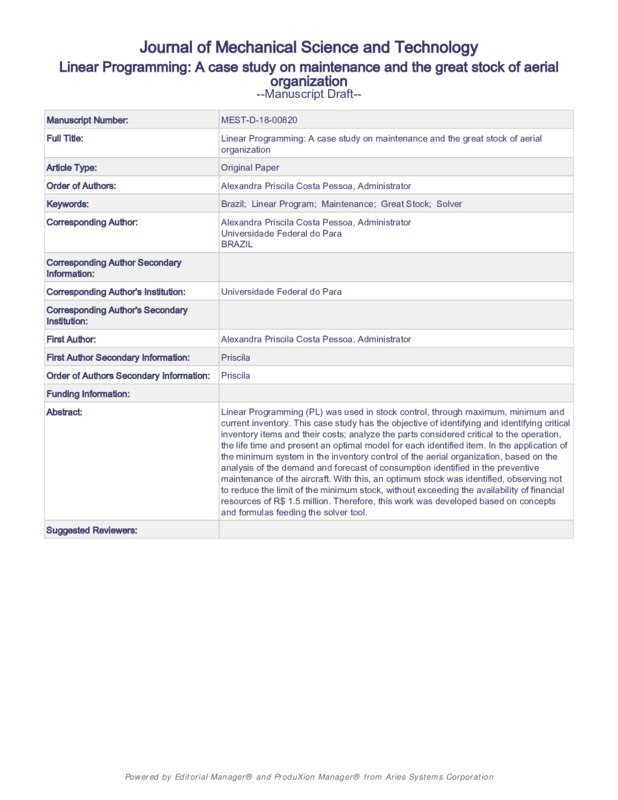Linear Programming: A case study on maintenance and the great stock of aerial organization
Item
-
Tipo do ITEM
-
Artigo Ciêntifico
-
Título do Artigo
-
Linear Programming: A case study on maintenance and the great stock of aerial organization
-
Descrição
-
Abstract
Linear Programming (PL) was used in stock control, through maximum, minimum and current inventory. This case study has the objective of identifying and identifying critical inventory items and their costs; analyze the parts considered critical to the operation, the life time and present an optimal model for each identified item. In the application of the minimum system in the inventory control of the aerial organization, based on the analysis of the demand and forecast of consumption identified in the preventive maintenance of the aerial. With this, an optimum stock was identified, observing not to reduce the limit of the minimum stock, without exceeding the availability of financial resources of R$ 1.5 million. Therefore, this work was developed based on concepts and formulas feeding the solver tool. Thus, savings of R$ 1,044,088.20 were obtained by finding the optimal stock, in relation to the maximum stock already established by the organization. The case study was carried out in an Aerial Organization located in the State of Amazonas in the city of Manaus.
Keywords: Brazil; Linear Program; Maintenance; Great Stock; Solver
-
Abstract
-
Abstract
Linear Programming (PL) was used in stock control, through maximum, minimum and current inventory. This case study has the objective of identifying and identifying critical inventory items and their costs; analyze the parts considered critical to the operation, the life time and present an optimal model for each identified item. In the application of the minimum system in the inventory control of the aerial organization, based on the analysis of the demand and forecast of consumption identified in the preventive maintenance of the aerial. With this, an optimum stock was identified, observing not to reduce the limit of the minimum stock, without exceeding the availability of financial resources of R$ 1.5 million. Therefore, this work was developed based on concepts and formulas feeding the solver tool. Thus, savings of R$ 1,044,088.20 were obtained by finding the optimal stock, in relation to the maximum stock already established by the organization. The case study was carried out in an Aerial Organization located in the State of Amazonas in the city of Manaus.
Keywords: Brazil; Linear Program; Maintenance; Great Stock; Solver
-
Língua do arquivo
-
inglês
-
Data da Publicação
-
Ano Desconhecido
-
Autores
-
Alexandra Priscila Costa Pessoa
-
Local
-
UFPA - 2018


